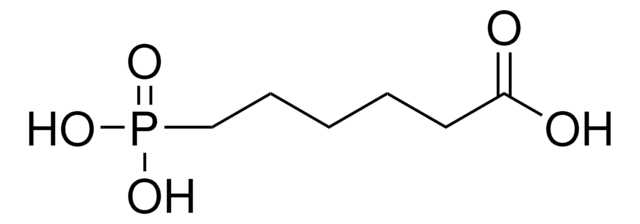735914
Octylphosphonic acid
97%
Synonym(s):
n-Octylphosphonic acid, OPA
About This Item
Recommended Products
Assay
97%
form
solid
mp
93-98 °C
SMILES string
CCCCCCCCP(O)(O)=O
InChI
1S/C8H19O3P/c1-2-3-4-5-6-7-8-12(9,10)11/h2-8H2,1H3,(H2,9,10,11)
InChI key
NJGCRMAPOWGWMW-UHFFFAOYSA-N
General description
Application
Signal Word
Danger
Hazard Statements
Precautionary Statements
Hazard Classifications
Acute Tox. 4 Oral - Skin Corr. 1B - STOT RE 2 Oral
Target Organs
Kidney,Bone
Storage Class Code
8A - Combustible corrosive hazardous materials
WGK
WGK 1
Flash Point(F)
Not applicable
Flash Point(C)
Not applicable
Certificates of Analysis (COA)
Search for Certificates of Analysis (COA) by entering the products Lot/Batch Number. Lot and Batch Numbers can be found on a product’s label following the words ‘Lot’ or ‘Batch’.
Already Own This Product?
Find documentation for the products that you have recently purchased in the Document Library.
Customers Also Viewed
Articles
Thin, lightweight, and flexible electronic devices meet widespread demand for scalable, portable, and robust technology.
Thin, lightweight, and flexible electronic devices meet widespread demand for scalable, portable, and robust technology.
Thin, lightweight, and flexible electronic devices meet widespread demand for scalable, portable, and robust technology.
Thin, lightweight, and flexible electronic devices meet widespread demand for scalable, portable, and robust technology.
Our team of scientists has experience in all areas of research including Life Science, Material Science, Chemical Synthesis, Chromatography, Analytical and many others.
Contact Technical Service














